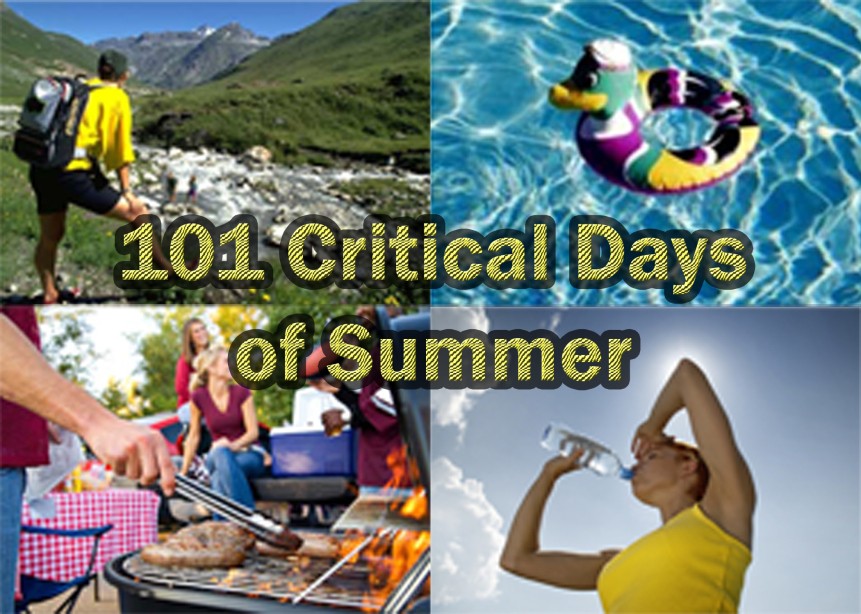
(Army.mil photo)
Remaining safe during the 101 days of summer
By Vinson Washington, ATC Safety Specialist
Welcome back…it’s almost Summer once again! The 101 critical days of summer begins Memorial Day weekend and ends after Labor Day. History shows this is the largest vacation period of the year. This is a time for fun in the sun filled with outdoor activities. Soldiers, Civilians, and their Families are out swimming, boating, visiting family and friends, playing, and having fun. With that in mind, here are a few safety tips that will hopefully make your summer a fun-filled safe one.
Swimming Pool and Water Safety Tips:
• Talk with everyone about water safety policies and practices. Ensure all family members, especially children are aware of the dangers associated with water.
Never mix alcohol or any illegal substances with any water activities.
• When participating in any type of water-related activity, it is important to identify all possible hazards and to know your limits. When swimming in rivers, lakes, and oceans, please be aware of swift currents and undertows. It’s highly recommended to always wear a life vest for those activities.
• Encourage everyone in the family to learn how to swim. Contact the local YMCA or Red Cross to enroll family members in swimming classes if needed.
• Ensure a competent adult is always watching the pool when in use. This person should know how to swim and be free of distractions, including their cellphone.
• Have your swimming pool inspected/serviced at the start of the season. Ensure your service provider checks for loose screws or other objects that could get snagged or potentially trap a swimmer. Keep the pool covered when not in use.
• Have an emergency action plan in place, including what to do or who to call in case of an emergency. Ensure you and other adults know what emergency steps to take in a drowning event, including adult and child CPR.
• Never allow unaccompanied children access to your pool. Countermeasures include security such as pool-area fencing and top-latched doors in the house.
• Never allow running or horseplay around the pool. Wet surfaces can become very slippery/dangerous if swimmers do not exercise caution when moving around the pool.
• Keep glass objects out of the pool area. Broken glass can cause significant injury when stepped on with bare feet.
Playground Safety
• Ensure children take off their bicycle helmets when playing on the playground equipment.
• Ensure the surfacing underneath the playground equipment is soft.
• Ensure children are sitting down while swinging. Have them slow down before they dismount a swing. Do not walk near someone who is swinging; always maintain a safe play zone distance.
• Ensure children use both hands when using climbers. Ensure they only climb on dry equipment to prevent them from falling.
• Never let your child climb up the front of the slide, as they may get hit by another child sliding down. Ensure children slide down feet first and one at a time to avoid a pile up.
Fireworks:
• Never allow children to play with or ignite fireworks; always ensure adult supervision.
• Read and follow all warning/instructions and be sure people are out of range before lighting fireworks.
• Only light fireworks on a smooth, flat surface away from the house, dry leaves, and flammable materials.
• Never try to relight fireworks that have not fully functioned or detonated.
• In case of a malfunction or fire, keep a bucket of water, garden hose, and/or fire extinguisher at the ready; call for emergency assistance if required.
Summer Road Trips….Know before you Go, Plan Ahead!
• Although no longer mandatory, the Travel Risk Planning System (TRiPS) is an excellent tool to assist in the preparation of your vacation or PCS move. For more information on TRiPS, follow the link, https://trips.safety.army.mil/TRiPS.
• Build time into your trip schedule to stop for food, frequent rest breaks, or any other scheduled/unscheduled travel plans.
• Conduct preventive maintenance checks before departure, during your trip and after arrival. Ensure you adjust your seat, mirrors, and climate controls before putting the car in gear.
• Pull over in a safe location to eat, drink, or rest. It only takes a few minutes.
• Check your route of travel for weather conditions and road construction. Plan alternate routes should you need to get off a heavily congested roadway.
• If possible, avoid driving at night and/or when conditions are more hazardous.
• Before your trip, research hotels along your route. Booking a hotel in advance can make stopping at night much easier and safer, Know Before you Go!
• During long trips, switch between drivers every few hours to avoid falling asleep behind the wheel. If you are driving alone, stop at a rest stop in a safe location or gas station every couple of hours to stretch your legs and take a rest break.
• Should your vehicle break down, have your emergency contacts readily available, stay in a safe location, and have food and an activity (i.e. book, computer, etc.) on hand to occupy yourself until help arrives. A small cooler with some water and snacks could be a life saver.


